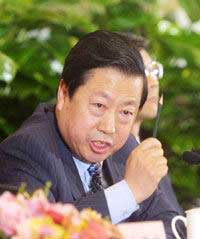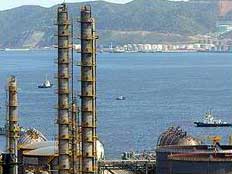As concerns about unsustainable economic development models increase—especially following the chemical spill that polluted the Songhua River—Beijing has begun to heed warnings from environmental organizations.
Premier Wen Jiabao emphasized that environmental protection and quality of life will be priorities in China’s upcoming five-year economic development plan…
China Faces Water Pollution Crisis
 |
| Zhou Shengxian, head of SEPA at a press conference in Beijing on March 11, 2006. (Photo: China Daily) |
Mr. Pan Yue, Deputy Director of the National Environmental Protection Administration (SEPA), stated that China will face an environmental crisis, particularly a water crisis, sooner than anticipated.
Since the chemical plant explosion in Jilin that contaminated the Songhua River in November 2005, leading major cities to temporarily shut down drinking water systems, there have been 45 pollution incidents in China. In mid-February, industrial waste from a power plant spilled into a river in Sichuan, disrupting the water supply for 28,000 residents for at least four days. Currently, over 300 million people in rural China lack access to clean water.
According to Mr. Pan, economic growth has increased the volume of chemical waste, and hazardous chemical spills into rivers. More than half of the 21,000 chemical companies located near the Yangtze and Yellow Rivers—sources of drinking water for millions—pose risks that could lead to “catastrophic consequences.” Since 2001, wastewater and industrial waste discharged into China’s rivers and lakes has increased annually. In 2004 alone, over 200 million tons of wastewater and 200 million tons of industrial waste were dumped into the country’s rivers and lakes.
Meanwhile, air pollution in China is also severe. Deputy Pan indicated that total sulfur dioxide (SO2) emissions, a key component of acid rain, exceed permissible levels by 80% and continue to rise. Children in Chinese cities are breathing toxic air equivalent to smoking two packs of cigarettes a day!
Environmental Pollution: A Major Issue in China’s Development
At a press conference just before the annual session of China’s National People’s Congress, Premier Wen Jiabao acknowledged that environmental pollution has become a significant issue in China’s current development and remains poorly addressed. He stated that while China has achieved most goals outlined in the 10th Five-Year Plan (2000-2005), environmental objectives have not been well met.
The government admits that most rivers are polluted, and more than one-third of the country is affected by acid rain. Heavily polluted major rivers leave hundreds of millions without clean drinking water. China’s cities rank among the most polluted in the world.
At the press conference on March 11, 2006, Zhou Shengxian, head of SEPA, warned that China must rapidly improve its environmental protection efforts. Otherwise, the nation will face disasters following two decades of rapid development that have led to air, water, and soil pollution.
Mr. Zhou asserted that pollution has become a ticking time bomb threatening social stability, referring to the rising number of public protests over environmental issues. Farmers are protesting against uncontrolled waste from factories destroying crops and polluting water sources.
According to Deputy Pan’s calculations, in the next 15 years, China aims to achieve a prosperous society—with GDP expected to quadruple—but if production and consumption levels remain constant, pollution and energy consumption will also quadruple.
Root Causes
Environmental experts note that negligence in environmental protection in previous years has led to dire consequences for China in recent times. As concerns about unsustainable economic development grow—especially after the Songhua River incident—Beijing has started to pay attention to warnings from SEPA and environmental organizations.
 |
| Dalian Petrochemical Plant (Northeast China). Following a series of severe pollution incidents, China will soon conduct environmental assessments on 127 petrochemical plants (Photo: AFP) |
Kevin May, director of the anti-toxics campaign for Greenpeace China in Guangzhou, noted that while laws exist, their enforcement is limited. For instance, the Hailin Brewery was producing alcohol without a wastewater treatment system as required. The local environmental protection agency ordered the brewery to suspend operations at the end of last year. However, as local authorities did not approve this request, the plant continued operating until it discharged pollutants into the Mudan River in Heilongjiang at the end of February.
Mr. Pan, Deputy Director of SEPA, believes that regulatory bodies in China lack the power to enforce environmental standards, and some leaders fail to recognize the importance of environmental protection.
Some leaders even believe that merely developing the economy will resolve all social, political, and other issues. A spokesperson for SEPA stated that environmental pollution incidents in China will occur more frequently due to imbalances in the industrial structure. Director Zhou mentioned that resolving pollution issues cannot be achieved overnight.
Environmental Protection: A Measure of Officials’ Competence
At the press conference just before the annual session of China’s National People’s Congress, Premier Wen Jiabao stressed that China should not follow the old path of polluting the environment and then addressing the damage. “We should leave green mountains and clean water for our descendants.”
According to Premier Wen Jiabao, instead of solely focusing on economic growth, China needs to pay attention to energy conservation and environmental protection. At the same time, China will implement strict industrial policies, banning enterprises and infrastructure projects that cause environmental pollution and waste resources. The country will also execute special programs to tackle pollution, particularly addressing water, air, and soil contamination step by step.
Additionally, the government will tighten the enforcement of environmental laws alongside existing regulations. Businesses that are energy-intensive and cause pollution will be shut down, and those causing severe pollution will face penalties.
During the first four years of the 10th Five-Year Plan, China invested a total of 600.6 billion RMB (approximately 72.3 billion USD) in pollution prevention and control. Environmental protection and quality of life will be priorities in the upcoming five-year economic development program.
Currently, the Chinese government has established new guiding principles that define goals, tasks, and policy measures for future environmental protection.
Under these guidelines, the ability to protect the environment will become an important measure to determine whether officials at all levels are fulfilling their roles. In other words, the evaluation of local officials will consider not only their economic development capabilities but also their environmental protection abilities. The predecessor of Director Zhou was forced to resign following the Songhua River pollution incident.
According to the head of SEPA, the Chinese government has just completed a long-term river management plan focused on pollution prevention and control. The government is striving to prevent incidents similar to the Songhua River pollution caused by chemical plants located near rivers and lakes. For its part, SEPA will require factories to report chemical spills within one hour of occurrence to avoid “concealing information.” The Songhua River pollution incident was not disclosed for several days, complicating crisis management.
Public Participation in Environmental Impact Assessments
On February 22, 2006, SEPA announced two temporary measures regarding public participation in environmental impact assessments. These measures will take effect on March 18, 2006. Accordingly, the public can participate in environmental impact assessments, consult experts, or attend specialized meetings or public forums. Project contractors will be required to provide details about the project’s environmental impact and the preventive measures they will implement.
Previously, China’s environmental impact assessment system relied almost entirely on administrative measures without public oversight.
Xu Kezhu, a professor at the China University of Political Science and Law, stated that this represents a significant legal advancement to enhance public participation in environmental matters.
| In 2005, nearly 30,000 environmental violations were investigated and penalized, leading to 2,609 businesses being forced to suspend operations or close down. Last month, the State Environmental Protection Administration (SEPA) threatened to shut down 11 companies and 10 factories, including metal smelting plants and chemical factories along the Tung Hua River, if these facilities failed to control pollutants. This year, SEPA and the Ministry of Supervision will oversee investigations into four major environmental pollution cases, including the Hai Lin Brewery distillation plant. At the same time, China will conduct environmental assessments on 127 petrochemical plants with a total investment of nearly $55 billion. These plants are crucial to China’s petrochemical industry. However, 21 of these plants have violated environmental protection regulations and have been fined. In May of last year, SEPA mandated that nine factories in the paper and ore smelting industries improve their wastewater treatment facilities. Currently, these nine factories have met wastewater treatment standards. In September of last year, SEPA announced that 14 wastewater treatment plants were functioning improperly or had ceased operations. To date, five of these 14 plants have resumed full operations. |


















































